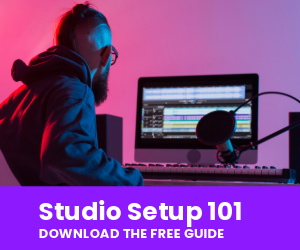
When I first started writing songs using the computer, I relied heavily on musical formulas to guide me. Over time, I compiled a system called AMP Formuliacs that has been incredibly effective. In this article, I’ll explain how to play any major or minor scale using simple interval patterns.
Understanding and being able to play scales is crucial for songwriting, whether you’re an artist, producer, beatmaker, or engineer. Knowing your scales will scale up your production. It’s helpful for melody writing and chord functions (chord progressions). For engineers, speaking the language of music will help you be more effective and engaged in your sessions. Beatmakers can make their tracks more interesting, as I mentioned in a previous post called “Unlocking the Secrets of Music Production.” So let’s dive in and learn a simple formula to play any major or minor scale. The cool thing is, once you learn these formulas, you’ll eventually learn your scales by memory.

The Importance of Scales
Being able to play scales is fundamental for anyone involved in music production. Scales are the foundation of melody and harmony. Understanding scales can enhance your songwriting, help you create more compelling chord progressions, and improve your overall musicality. For producers and beatmakers, knowing scales can make your tracks more musically interesting. For engineers, it allows you to communicate more effectively with artists and participate more actively in the creative process.
The Octave and Seven Notes of the Scale
Before we dive into the formulas, let’s review the basics of the octave. An octave is a musical interval that spans eight notes. Within an octave, there are 12 distinct notes, but for major and minor scales, we primarily focus on seven of these notes. The secret to understanding scales is encoded in the C major scale and its relative minor scale, A minor. These scales are easy to remember because they consist of all the white keys on the piano.
By practicing these formulas, you’ll start to memorize the scales, which will become second nature over time.

The C Major Scale
The C major scale is a great starting point because it uses only the white keys on the piano. The notes are:
C, D, E, F, G, A, B
The A Minor Scale
The A minor scale is the relative minor of C major, meaning it uses the same notes but starts on A. The notes are:
A, B, C, D, E, F, G
Intervals and Formulas
Intervals are the distances between two notes. To construct major and minor scales, we use specific interval patterns.
Major Scale Formula
The major scale formula is:
Whole, Whole, Half, Whole, Whole, Whole, Half
To apply this formula, start on any note (the root), then follow the pattern of whole and half steps to complete the scale.

Minor Scale Formula
The minor scale formula is:
Whole, Half, Whole, Whole, Half, Whole, Whole
Similar to the major scale, start on any note and follow this pattern to construct a minor scale.

Applying the Formulas
Let’s apply these formulas to a key. For example, if we want to play a G major scale:
- Start on G.
- Whole step to A.
- Whole step to B.
- Half step to C.
- Whole step to D.
- Whole step to E.
- Whole step to F#.
- Half step to G.
You have just played the G major scale!
For a G minor scale:
- Start on G.
- Whole step to A.
- Half step to Bb.
- Whole step to C.
- Whole step to D.
- Half step to Eb.
- Whole step to F.
- Whole step to G.
You have just played the G minor scale!
Understanding and being able to play scales is essential for anyone involved in music production. Whether you’re writing melodies, creating chord progressions, or communicating with other musicians, knowing your scales will enhance your musical abilities. By using the AMP Formuliacs, you can easily learn to play any major or minor scale. With practice, these scales will become second nature, allowing you to create more interesting and musically complex tracks.
Remember, the key to mastering scales is consistent practice and exploration. So, take your time, have fun, and let your musical creativity flourish.
Learn Music Theory with AMP Music Lab
Ready to take your music production skills to the next level? Join our AMP Music Production Training Program at AMP Music Lab in West Palm Beach, FL, or enroll in our online AMP Virtual Instruction Program (AMP VIP). Whether you’re a beginner or an experienced musician, our comprehensive training will help you unlock your full potential.
















